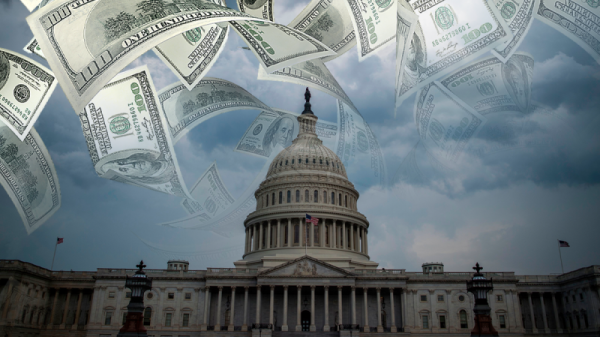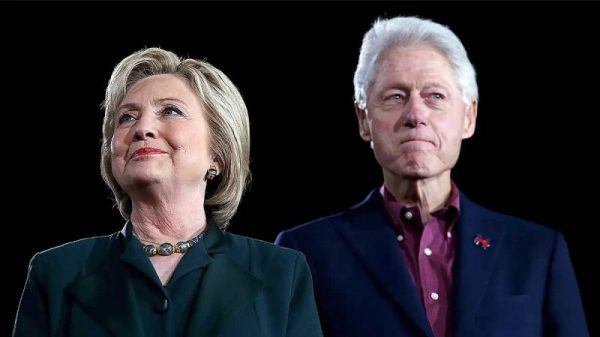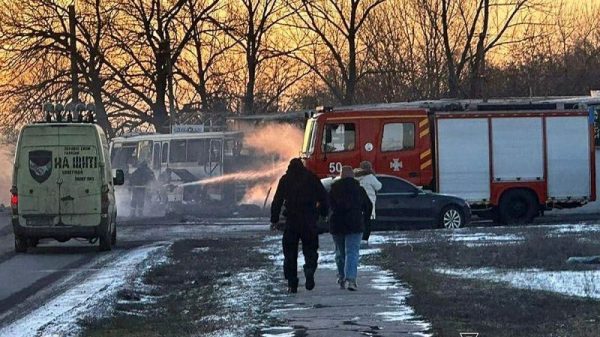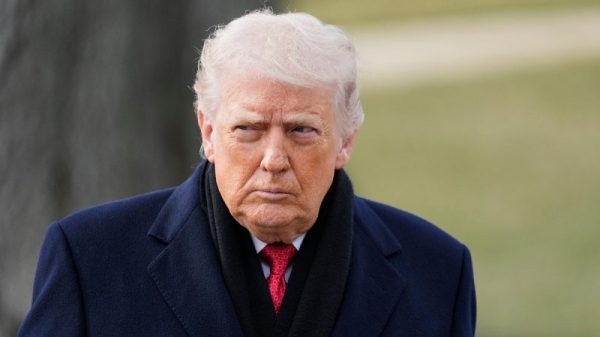The first week of Donald Trump’s criminal trial in New York ended Friday with a full panel of 12 jurors and six alternates in place ahead of opening statements expected Monday.
Jury selection saw numerous moments of drama and tumult, including potential jurors growing deeply emotional and the judge chiding Trump. The former president has pleaded not guilty to 34 counts of falsifying business records.
Here is a look at the historic trial’s first days, as told by some of its participants.
During jury selection, New York Supreme Court Justice Juan Merchan, who is hearing the case, placed significant weight on how the potential jurors felt.
Potential jurors were asked whether they could not be fair or impartial in deciding the case. If they felt that way, they were promptly excused. In some cases, though, potential jurors spent some time mulling the issue before coming to that conclusion.
That’s what happened with one potential juror, who came in Friday morning and, after sleeping on it, said she did not believe she could be impartial after all. Merchan excused her.
It only took until the trial’s second day for Merchan, who is hearing the case, to admonish Trump for his behavior in court.
Trump’s courtroom conduct has run afoul of other judges in some of his recent cases. When the writer E. Jean Carroll sued Trump for defamation, the judge hearing the case threatened to throw him out of court for not keeping quiet while she testified. And during a civil fraud trial against Trump and his business, he clashed with a different judge, who urged his attorneys to “control your client.”
In this case, Merchan’s admonition came while potential jurors were questioned Tuesday. Trump appeared to react to a potential juror — and Merchan did not appreciate it.
Merchan addressed Trump’s attorney, Todd Blanche, saying that his client “was audibly uttering something” and that “he was gesturing and he was speaking in the direction of the juror” while they were nearby.
“I will not tolerate that,” Merchan said.
Across Trump’s various criminal cases, his attorneys have sought — successfully, in some cases — to delay the proceedings whenever possible. They also tried to have this trial postponed, but they were rejected again and again.
In court on Monday, Blanche reiterated the defense’s objection to the trial taking place now. Blanche’s contention: It was unfair to have the trial take place while Trump, the presumptive Republican presidential nominee, is campaigning ahead of the November election. The trial proceeded after his remark.
Later in the week, Merchan also expressed his irritation with Trump’s side for its repeated attempts to seek new rulings on issues that had been decided. “That has to end,” Merchan told Trump’s lawyers Friday. “There comes a point when you accept my rulings.”
Jury selection included some hiccups along the way. Merchan has said potential jurors’ names would only be shared with prosecutors and defense attorneys — and not released publicly.
But the jury questionnaire included inquiries about some potentially identifying personal details, such as jobs and past and present employers. Some of the information has circulated in some news reports and online.
A woman who had been selected as Juror No. 2 on Tuesday came in Thursday morning with concerns after friends, co-workers and relatives reached out, apparently recognizing her connection to the trial.
“I don’t believe at this point that I can be fair and unbiased and let the outside influences not affect my decision-making in the courtroom,” she said. She was excused from the jury.
Speaking to reporters on Friday morning, Trump said a gag order that Merchan had placed on him in the case had taken away his “constitutional rights to speak.”
Merchan imposed a gag order last month prohibiting the former president from publicly commenting on witnesses in the case “concerning their potential participation in the investigation or in this criminal proceeding.” He also barred Trump from commenting on potential jurors, court employees and the staff of Manhattan District Attorney Alvin Bragg. Then, after Trump publicly attacked Merchan’s daughter, the judge expanded the order to also block him from commenting on Merchan’s and Bragg’s families.
Prosecutors say Trump has already repeatedly violated this gag order, which his attorneys dispute. Merchan has set a hearing for Tuesday morning to address the matter.
Jury selection in this case was expected to be tricky, given that it involves a defendant who is so prominent and about whom so many people have deeply entrenched opinions.
Steinglass, one of the prosecutors in the case, acknowledged during jury selection that simply knowing about Trump was not disqualifying. Addressing potential jurors, Steinglass said the case had “nothing to do with your personal politics,” but required jurors who would not let their beliefs influence their decisions.
Susan Hoffinger, another prosecutor, also reminded potential jurors that the case was “not about who you’re going to vote for in the fall.”
Much of the attention on this case has understandably focused on the defendant.
But during the trial’s first week, courtroom proceedings were largely focused on the potential jurors, who were asked a battery of questions about topics including their jobs, social media habits, sources of news and feelings about Trump.
Multiple possible jurors said they were feeling increasingly nervous during the jury selection process.
One of those people fought back tears Friday, while saying the pressure of the situation was overwhelming. Her voice broke while she spoke in court. Merchan soon excused her.
Perry Stein in Washington and Shayna Jacobs, Devlin Barrett and Rachel Weiner in New York contributed to this report.
The first week of Donald Trump’s criminal trial in New York ended Friday with a full panel of 12 jurors and six alternates in place ahead of opening statements expected Monday.
Jury selection saw numerous moments of drama and tumult, including potential jurors growing deeply emotional and the judge chiding Trump. The former president has pleaded not guilty to 34 counts of falsifying business records.
Here is a look at the historic trial’s first days, as told by some of its participants.
During jury selection, New York Supreme Court Justice Juan Merchan, who is hearing the case, placed significant weight on how the potential jurors felt.
Potential jurors were asked whether they could not be fair or impartial in deciding the case. If they felt that way, they were promptly excused. In some cases, though, potential jurors spent some time mulling the issue before coming to that conclusion.
That’s what happened with one potential juror, who came in Friday morning and, after sleeping on it, said she did not believe she could be impartial after all. Merchan excused her.
It only took until the trial’s second day for Merchan, who is hearing the case, to admonish Trump for his behavior in court.
Trump’s courtroom conduct has run afoul of other judges in some of his recent cases. When the writer E. Jean Carroll sued Trump for defamation, the judge hearing the case threatened to throw him out of court for not keeping quiet while she testified. And during a civil fraud trial against Trump and his business, he clashed with a different judge, who urged his attorneys to “control your client.”
In this case, Merchan’s admonition came while potential jurors were questioned Tuesday. Trump appeared to react to a potential juror — and Merchan did not appreciate it.
Merchan addressed Trump’s attorney, Todd Blanche, saying that his client “was audibly uttering something” and that “he was gesturing and he was speaking in the direction of the juror” while they were nearby.
“I will not tolerate that,” Merchan said.
Across Trump’s various criminal cases, his attorneys have sought — successfully, in some cases — to delay the proceedings whenever possible. They also tried to have this trial postponed, but they were rejected again and again.
In court on Monday, Blanche reiterated the defense’s objection to the trial taking place now. Blanche’s contention: It was unfair to have the trial take place while Trump, the presumptive Republican presidential nominee, is campaigning ahead of the November election. The trial proceeded after his remark.
Later in the week, Merchan also expressed his irritation with Trump’s side for its repeated attempts to seek new rulings on issues that had been decided. “That has to end,” Merchan told Trump’s lawyers Friday. “There comes a point when you accept my rulings.”
Jury selection included some hiccups along the way. Merchan has said potential jurors’ names would only be shared with prosecutors and defense attorneys — and not released publicly.
But the jury questionnaire included inquiries about some potentially identifying personal details, such as jobs and past and present employers. Some of the information has circulated in some news reports and online.
A woman who had been selected as Juror No. 2 on Tuesday came in Thursday morning with concerns after friends, co-workers and relatives reached out, apparently recognizing her connection to the trial.
“I don’t believe at this point that I can be fair and unbiased and let the outside influences not affect my decision-making in the courtroom,” she said. She was excused from the jury.
Speaking to reporters on Friday morning, Trump said a gag order that Merchan had placed on him in the case had taken away his “constitutional rights to speak.”
Merchan imposed a gag order last month prohibiting the former president from publicly commenting on witnesses in the case “concerning their potential participation in the investigation or in this criminal proceeding.” He also barred Trump from commenting on potential jurors, court employees and the staff of Manhattan District Attorney Alvin Bragg. Then, after Trump publicly attacked Merchan’s daughter, the judge expanded the order to also block him from commenting on Merchan’s and Bragg’s families.
Prosecutors say Trump has already repeatedly violated this gag order, which his attorneys dispute. Merchan has set a hearing for Tuesday morning to address the matter.
Jury selection in this case was expected to be tricky, given that it involves a defendant who is so prominent and about whom so many people have deeply entrenched opinions.
Steinglass, one of the prosecutors in the case, acknowledged during jury selection that simply knowing about Trump was not disqualifying. Addressing potential jurors, Steinglass said the case had “nothing to do with your personal politics,” but required jurors who would not let their beliefs influence their decisions.
Susan Hoffinger, another prosecutor, also reminded potential jurors that the case was “not about who you’re going to vote for in the fall.”
Much of the attention on this case has understandably focused on the defendant.
But during the trial’s first week, courtroom proceedings were largely focused on the potential jurors, who were asked a battery of questions about topics including their jobs, social media habits, sources of news and feelings about Trump.
Multiple possible jurors said they were feeling increasingly nervous during the jury selection process.
One of those people fought back tears Friday, while saying the pressure of the situation was overwhelming. Her voice broke while she spoke in court. Merchan soon excused her.
Perry Stein in Washington and Shayna Jacobs, Devlin Barrett and Rachel Weiner in New York contributed to this report.





















